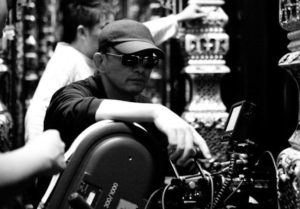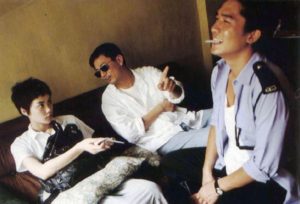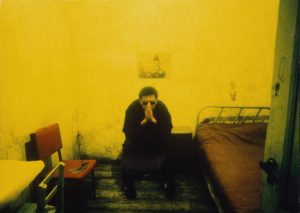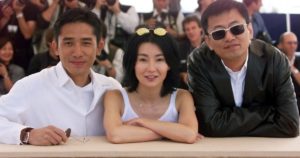Art, Love, and Freedom — Celebrating Wong Kar Wai’s 63rd Birthday
Wong Kar Wai (from The Indian Express)
The famous director Wong Kar Wai just turned 63 years old today!
Since Wong has had a considerable influence on both Hong Kong and the Chinese film industry, we’re taking you into his aesthetic movie world today!
Childhood: Immersed in Cinemas
Wong Kar Wai was born in Shanghai in 1958. He soon emigrated to British Hong Kong with his family; therefore, he spent all his childhood in Hong Kong.
It is no exaggeration to say that Wong immersed himself in movies throughout his childhood. His mother being a huge movie fan, Wong was always taken to the cinema after school to watch all kinds of movies. He later said: “The only hobby I had as a child was watching movies”. Thus, Wong’s enthusiasm for films was implanted in his heart at a young age.
Early Career: Embarking on His Own Path
Growing up under such cultural influences, Wong then majored in graphic design in Hong Kong Polytechnic University (PolyU) in 1980. After graduating, he soon began his career as a screenwriter; however, writing mostly for commercial films, TV series, and soap operas, which was something contrary to his own aesthetic and cultural identification.
His production speed couldn’t match the “fast-food-like” Hong Kong film industry at that time. Also, his tempering and polishing of an image was incompatible with the mainstream. Therefore, he decided to take the plunge and embarked on the path he insisted on, and so he started to make films on his own.
External Art Form and Inner Vitality
Wong made films with the eyes of an artist and the spirit of a poet. He not only took on his own career, but also raised the Hong Kong film industry to new heights of aesthetics and creativity. The famous American film director Martin Scorsese once praised the kind of beauty in Wong’s films and emphasized that there’s something that only can existin Wong’s works, which is the essence of cinema.
Speaking of Wong’s films, the external art form is what critics have always been discussing and analyzing. However, apart from this, the inner feelings and the deep insight into humanity are what make Wong’s films so touching. Despite the cold and gloomy urban tones of his films, the warmth and tenderness underneath can still be seen. And despite the exquisite analysis and external art form, Wong stays humble and gold-plated deep inside. “Being a master, the comments from critics are not that important to me. Instead, I make movies to bring the joy, sadness, and the loss of my childhood experience to the audience,” he said. He wants to bring the vitality of movies to the world, nothing more.
Wong Kar Wai at the filming scenes (from Senses of Cinema)
Fragmentary Narrative
Although Wong’s narrative of story-telling is always fragmentary, and sometimes even without a clear theme, the audiences can’t help but project their emotions onto the scattered plots, the seemingly insignificant dialogue, and even the diverted storylines.
Watching Wong’s films is like looking at the world through a kaleidoscope. The audiences keep rotating the kaleidoscope and see all kinds of gorgeous totems and lights coming out, without fixed shape or certain color. That is to say, though scattered and fragmentary, Wong’s films are full of surprises and can always take audiences to a whole new world of amazement.
Also, despite the broken story, audiences can still piece everything together and form a complete picture of humanity. This is the biggest charm of Wong’s films: people roam in his hopeless romantcism, and feel for the characters.
Wong Kar Wai filming “Chungking Express” (from Cinema, mon amour)
Physical Space to Emotional Environment
Many people argue that Wong Kar Wai does not work from a script, but the truth is he is composing every day. For Wong, the most important part of the script is to know the location of the story. Only when he knows the place can he decide what the characters should do in that space. Therefore, the physical space in his films is so important to him that he must be aware of every detail, even when the location isfictional.
Wong’s job is to extend the physical environment to the three-dimensional “atmosphere,” which is the “air” that fills and hangs in space. The air then forms the emotional environment for the characters and is filled with emotional reactions that cannot be seen but only felt.
Therefore, in Wong’s films, the characters (actors) not only exist physically in a specific place, but also mentally interact and connect with it. The building of certain scenes and spaces is just the construction of the micro worldview in Wong’s films.
Wong Kar Wai at the scene of “Happy Together” (from Senses of Cinema)
Shaping of Characters
In addition to the space of Wong’s films, the story frame and characters form the important backbone in his scripts. Wong is always adjusting the structure of his films in order to fit the characters in. During his filmmaking process, he gradually sees the genesis of each character, and feels the need to veer off from the characters’ perspectives again and again.
Therefore, in Wong’s movies, the characters (actors) are indispensable, and are like tiny organisms that cannot be removed from the plot. The characters’ destiny generates or connects to the big events in the films. As a result, we cannot forget the characters and even the actors outlined in Wong’s movies. He always captures their most fascinating look.
Wong Kar Wai and actors from “In the Mood For Love” (from South China Morning Post)
Free and Humble, the “Grandmaster” in the Film Industry
People’s impressions of this “grand master” are always cold and mysterious; they have limited knowledge of him. It seems like Wong is isolated from the outside world, just likethe effect of his signature sunglasses.
However, for Wong, the sunglasses make him feel more secure, which are like a protective net. They make him think calmly and give him more space, which bring him a sense of freedom when facing the altering world.
This kind of freedom is filtered by rationality, which frees him from being restricted by too many emotions, personal values, and a strong stand. It is the freedom to tolerate the world with gentleness and humbleness, which is what makes a creator admirable and respectful.
Just like the flat Chinese cake in Wong Kar Wai’s famous film, “The Grandmaster,” the cake represents the whole world, and so do Wong’s films. If you put all Wong’s films together, they form city and forest, past and future, time and space; they are the world as a whole. Wong Kar Wai is the grandmaster of the film industry.
Eternal Love for Films
Looking back over his sixty years, Wong has been through the golden years of Hong Kong and the chaotic times too.
Although compared to other famous directors, he hasn’t produced a lot and sometimes even bombs at the box office. However, when you truly watch his films wholeheartedly, you can see the purest beauty in them as if you can see the five-year-old boy happily enjoying movies in the cinema.
Despite the change of time affecting the film industry and the way people watch movies, Wong’s intention to make his art and the passion for films never change. “I’m tired of all this ‘cinema is dead’ shit, people enjoy watching movies. Period,” Wong said.
Happy 63rd birthday to Wong Kar Wai, who wanders through time freely and passionately.
If you haven’t watched any of his films, we suggest you pick one and enjoy it on this special day! May you come to believe in the beauty of the world and its humanity; believe in love and art as Wong always does.
Picture description: Wong Kar Wai at the Cannes Film Festival, 2000 (from Tatler Hong Kong)
















Comments are closed.